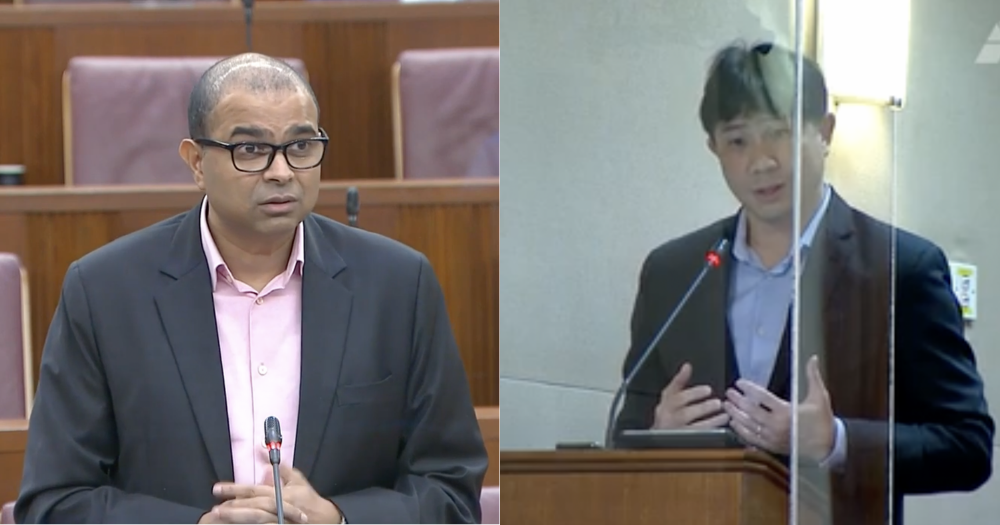Follow us on Telegram for the latest updates: https://t.me/mothershipsg
In Parliament on Tuesday (Sep. 14), Senior Minister of State for Health Janil Puthucheary responded to parliamentary questions from various Members of Parliament (MPs) on Singapore's Covid-19 situation, vaccination programme, and transition plans.
Two questions by Workers' Party MP Jamus Lim about the speed of Singapore's vaccine rollout resulted in a back-and-forth exchange.
Singapore's vaccination programme "has not been slow at all": Janil
Lim asked why there were delays in the first receipt of Covid-19 vaccine shipments in December 2020, given that Singapore had committed to advanced purchase agreements as early as June 2020.
He also asked about the constraints that prevented a more rapid vaccine rollout rate, at least until April 2021.
In response, Janil said that Singapore's vaccination programme "has not been slow at all":
"We were one of the earliest countries to secure vaccine supplies, with the first shipments of the Pfizer-BioNTech vaccines arriving in mid-December 2020, one of the fastest to roll out a comprehensive vaccination programme, and we have now achieved a vaccination coverage that is one of the highest in the world."
As of Sep. 9, he stated, 81 per cent of Singapore's population have been fully vaccinated, while 85 per cent have received at least one dose.
Jamus: Why wasn't rollout faster in first three months?
In a supplementary question, Lim said that he "continue[s] to disagree with the characterisation that our rate of vaccination rollout was, in fact, as rapid as could be".
Lim acknowledged that Singapore's vaccination rate today is among the highest in the world, and that there was an acceleration in the rollout rate around end-March and early-April of this year.
However, he asked for further clarification about the specific three month gap when the rollout rate was low, from January to April of this year, between the time when Singapore received its first shipments and when the rollout rate accelerated, even though Singapore had already negotiated advance purchase agreements.
"Given this fact that we had already negotiated these advance agreements, it's puzzling why we were not able to accelerate this rollout in the first three months of this year."
Janil: The member is free to disagree
Janil said, "The member is quite free to disagree with me."
The doses were indeed delivered to Singapore as part of the advance purchase agreement, but that the manufacturers were "under some strain to produce as much as they can, not just for us but for the whole world".
He added that the country's pace at the beginning of the vaccine rollout was "constrained by the supply that was made available to us from the manufacturers", something he said has been "explained several times".
Still, Janil said that he felt that Singapore's contractual agreements were honoured.
"But I thank [Jamus] for agreeing that now we have indeed done relatively well compared to perhaps what the situation looked like in March. And ultimately it's that destination which is of importance and will protect us."
Not reversing course, nor charging ahead
In his response to other MPs, Janil reiterated what has already been announced by the Multi-Ministry Taskforce (MTF) previously.
While the country has met the vaccination target of 80 per cent, the government has decided to "pause" the transition plan previously laid out due to the rising number of cases. This is because other than vaccination rates, the government must also consider metrics like case numbers and transmission trajectory.
"We are not reversing course, and neither are we charging ahead," he said, echoing a similar statement made by Minister for Health Ong Ye Kung in an MTF press conference on Sep. 10.
Importance of vaccination
Janil also emphasised the importance of vaccination to open up social and economic activities safely, and re-outlined the plans for Singapore's booster programme for the elderly and immunocompromised.
Elderly individuals aged 60 years and above will be able to receive a Covid-19 booster shot six to nine months after their second dose. Immunocompromised individuals will receive their third dose two months after their second one.
He said that the Expert Committee on Covid-19 vaccination will continue to observe global and local data — the risk of adverse reactions in particular — before recommending booster vaccines to additional population groups.
Janil added the reminder that pregnant and breastfeeding women are advised by experts to take the Covid-19 vaccination, as they will benefit from its protection.
Four vaccination centres will close, others to scale down
In light of 81 per cent of people in Singapore being fully vaccinated, four vaccination centres will be closed on Sep. 30, and others may be scaled down. However, the number of Public Health Preparedness Clinics (PHPCs) which offer vaccinations will be increased, from 79 currently to around 100 by end-October.
Those who are unable to go to a centre or visit a PHPC will be visited by MOH's mobile vaccination teams.
The Committee is also "actively studying a heterologous strategy" involving non-mRNA vaccines.
Janil added that Singapore is negotiating with suppliers for non-mRNA booster shot, and a few are preparing applications.
Top photos via CNA.
Follow and listen to our podcast here
If you like what you read, follow us on Facebook, Instagram, Twitter and Telegram to get the latest updates.
